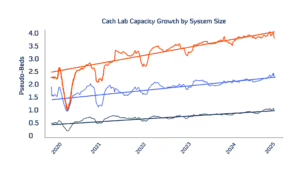egnite Inc.’s Real-World Evidence Demonstrates Improved Survival in Asymptomatic Aortic Stenosis Patients Undergoing Aortic Valve Replacement (AVR)
Key Findings Demonstrate 3x Improved Survival for Asymptomatic AS Patients Undergoing AVR versus AS Patients Presenting with Acute Valve Syndrome
ALISO VIEJO, Calif. – October 28, 2024 – egnite, Inc., a leading cardiovascular digital health company, today announced the results of its seminal research on the real-world impact of clinical presentation among patients with moderate or greater aortic stenosis (AS) undergoing aortic valve replacement (AVR).
Presented by Philippe Généreux, MD, Director of the Structural Heart Program at Morristown Medical Center’s Gagnon Cardiovascular Institute, at the Transcatheter Cardiovascular Therapeutics (TCT) conference and published in Structural Heart Journal, the study analyzed data from over 2 million patients in egnite’s real-world database of 29 teaching and non-teaching U.S. health systems
Results demonstrated a marked difference in two-year outcomes after AVR between asymptomatic patients and those presenting with progressive valve syndrome (PVS) or acute valve syndrome (AVS)
Patients presenting with asymptomatic AS were found to have a more than threefold reduction in the risk for mortality and heart failure hospitalization after treatment with AVR as compared to their AVS counterparts, highlighting the life-saving potential of AVR before the onset of symptoms.
Key Findings Demonstrated:
- Clinical Presentation Before AVR: 14.0% (asymptomatic), 34.3% (PVS), 51.7% (AVS)
2-Year Post AVR:
- All-Cause Mortality: 5.8% (asymptomatic), 7.6% (PVS), 17.5% (AVS)
- Hospitalization for Heart Failure: 11.1% (asymptomatic), 19.0% (PVS), 41.5% (AVS)
Généreux stated, “These findings are extremely important and complementary to the recently presented EARLY TAVR Trial, published in the NEJM. The absence of symptoms was traditionally considered a sign of relative safety. However, this study shows how frequent acute valve syndrome is in patients undergoing AVR, and how patients would benefit greatly from intervention before symptoms appear. Patients presenting with acute valve syndrome, such as syncope, NYHA III-IV heart failure, or pulmonary edema, had a three-fold increase in mortality two years after successful AVR. As a matter of fact, one out of six patients will die at two years if we wait for acute or advanced symptoms before performing AVR.”
About egnite, Inc.
egnite is a data-centric digital health company committed to advancing the health of our society through innovative cardiovascular solutions. egnite uses AI-driven algorithms and big data to produce business intelligence for healthcare, elevating the role of data in critical decisions. The company, based in Aliso Viejo, California, partners with leading hospitals and life sciences organizations to transform care delivery for cardiovascular patients. For more information, visit www.egnitehealth.com.
About Morristown Medical Center
Morristown Medical Center and Gagnon Cardiovascular Institute are part of Atlantic Health System based in Morristown, New Jersey. For more information, go to www.atlantichealth.org.



